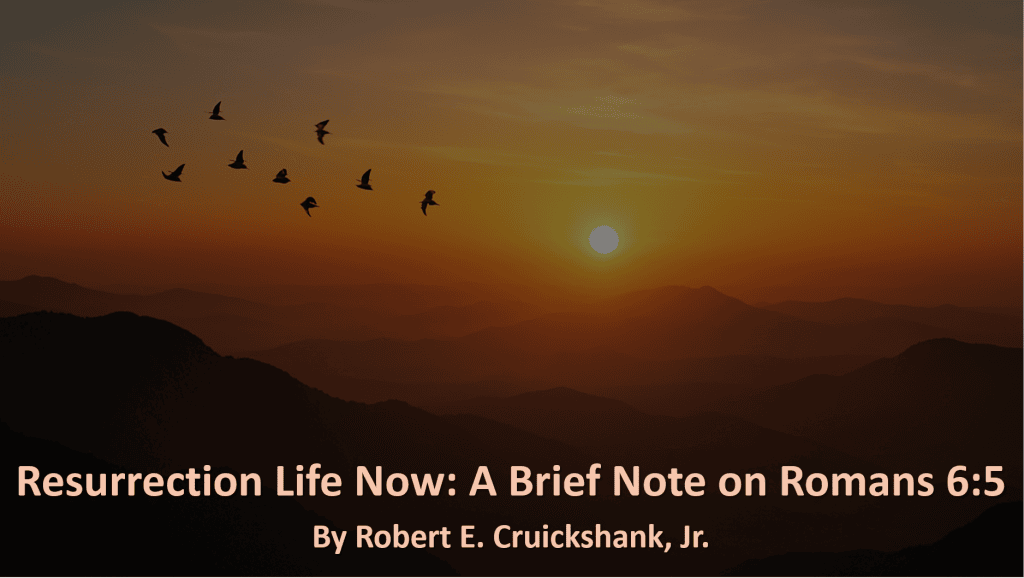Resurrection Life Now: A Brief Note on Romans 6:5
By Robert E. Cruickshank, Jr
Copyright © Robert E. Cruickshank, Jr. (October 18, 2025)
All Rights Reserved
“For if we have become united with Him in the likeness of His death, certainly we shall also be in the likeness of His resurrection, knowing this, that our old self was crucified with Him, in order that our body of sin might be done away with, so that we would no longer be slaves to sin; for the one who has died is freed from sin” (Romans 6:5-7).
Many view Romans 6:5 in a way that disconnects it from its context and, in turn, disconnects that context from having any practical relevance in our lives today. For them, this is all about some event, at the end of human history, when dead humans get their human bodies back. But the whole warp and woof of Romans 6 is the imperative of Christian living in this life now, and the immediate verses before and after verse 5 reinforce this.
The main point of the preceding verse is that believers should be currently walking in the “newness of life” (Rom. 6:4). Verse 6 reiterates this: “our old self was crucified with Him, that our body of sin might be done away with…” (Rom. 6:6a). The NASB gives a marginal note for the phrase “done away with” indicating that it means to be “made powerless.” The word is katargeó, and this is certainly the sense in which Paul uses it up to this point (i.e., Rom. 3:3, 4:1; 4:14).
Paul then goes on to say that “we should no longer be slaves to sin – for he who has died is freed from sin” (Rom. 6:6b-7). These statements illuminate verse 5 and give it its context and bring it to life – it’s all about having real life, resurrection life, in this life now.
This is reinforced throughout the rest of the chapter. In isolation, verse 8 might seem to speak of a solely future reality: “Now if we have died with Christ, we believe that we shall also live with Him” (Rom. 6:8). But Paul builds on this in verses 9 and 10 and clarifies his meaning in verse 11: “Even so, consider yourselves dead to sin and alive unto God in Christ Jesus” (Rom. 6:11). In other words, our death to sin and life in Christ are dual realities in this life now.
Thus, we should not let sin reign in our mortal bodies or obey its lusts (Rom. 6:12). Right now, here today, we are to present ourselves “to God as those alive from the dead” and our members “as instruments of righteousness to God” (Rom. 6:13). Paul’s point isn’t that we are to spend our lives waiting to die, only so we can then spend eons in a disembodied state waiting to get our bodies back. Paul is motivating believers to live righteous lives – in the here and now.
As in Ephesians 2:6 and Colossians 2:12, Paul is speaking of believers participating in the power of Christ’s resurrection in this life now. And he’s saying nothing different than what he said in Galatians and Corinthians. We’ve been crucified with Christ and the life that we now live, we live to the Son of God (Gal. 2:20). We are “always carrying about in the body the dying of Jesus, that the life of Jesus may also be manifested in our body” (2 Cor. 4:10). Paul’s theology in Romans 6 comports with his theology elsewhere. If we identify with Christ in His death, then we identify with Him in His resurrection by living as instruments of righteousness and no longer as slaves to sin (Rom. 6:14-21).
Finally, our freedom from sin and enslavement to God derives the benefit of sanctification, resulting in eternal life (Rom. 6:22). But eternal life begins now (1 John 5:11-13), and the full realization of that life is in heaven where the Tree of Life is (Rev. 2:7). None of this awaits some future event, thousands of years down the road. And Romans 6 has everything to do with living out the reality of Christ’s life within us now, and nothing to do with waiting for that life to materialize when our physical bodies rematerialize at some point in the far, far, distant future.
In short, the overall context of the passage is an ethical imperative to walk in newness of life now: “Even so consider yourselves dead to sin, but alive to God in Christ Jesus” (Rom. 6:11). This has far-reaching, practical, and real value today – not just in the far-reaching future. Let’s live for Him in a way that honors His sacrifice and demonstrates the power of His resurrection in our daily lives!
_______________________________________________________________________________
[Featured Image]: Golden Dawn Over Mountain Peaks, by Robert Edwin Creations, Copyright © Robert E. Cruickshank, Jr. (October 18, 2025) – all rights reserved, reuse of this image is only by permission.


